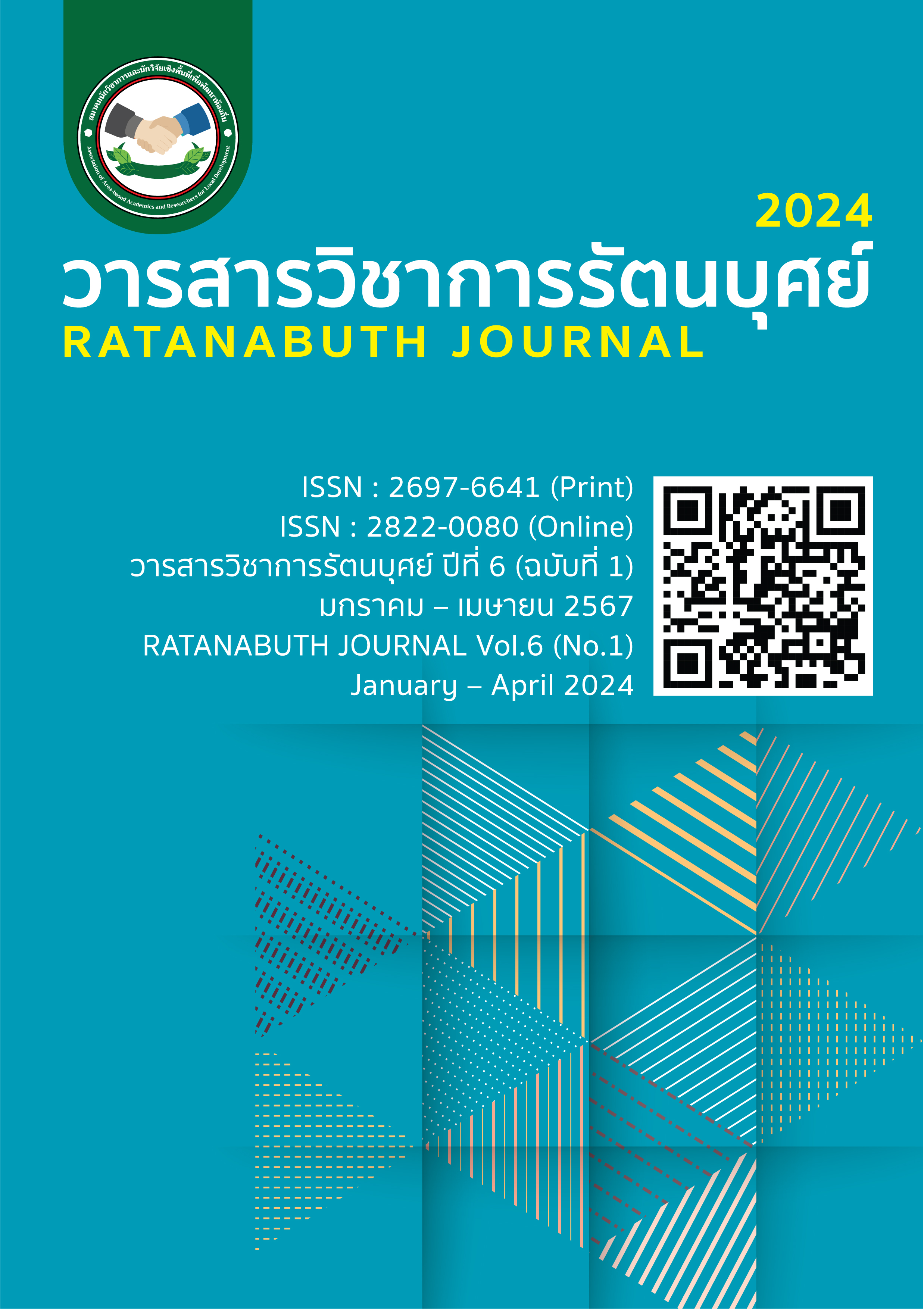Role of Advanced Transportation Management Systems in Enhancing the Distribution of Frozen Food from Thailand to Japan Role of Advanced Transportation Management Systems in Enhancing the Distribution of Frozen Food from Thailand to Japan
Main Article Content
Abstract
The development of technology in the present era has greatly impacted transportation industry and transportation management solutions. Transportation management system (TMS), especially in the transport of frozen goods, is very important in opening up the international market. In Thailand and Japan, frozen food is very popular and has high demand from the world market. Studying the potential impact of modern transportation management systems on increasing the efficiency of frozen food delivery between Thailand and Japan requires careful consideration and analysis to find solutions and improvements to the system. Transportation management system (TMS) to be able to work efficiently in complex and constantly changing situations. This study aims to investigate the potential impact of modern Transportation Management Systems (TMS) on enhancing the efficiency of frozen food transportation between Thailand and Japan. This research uses a narrative review method, gathering data from reputable academic publications, industry reports, and legal documents. The selection criteria are determined by considering variables such as relevance, feasibility, and credibility of the advanced transportation management system. Several benefits are associated with using sophisticated Transportation Management Systems (TMS), such as improved route optimization, real-time tracking capabilities, cost savings, reduced transit times, and enhanced product standards. Although implementing complex Transportation Management Systems (TMS) offers clear benefits, there are still challenges related to technology integration, training, and initial investment costs. However, sustainable benefits such as increased financial profitability and customer satisfaction outweigh these challenges. Sophisticated Transportation Management Systems (TMS) become catalysts for significant changes in the international frozen food distribution industry between Thailand and Japan. These systems provide innovative solutions to long-standing challenges, facilitating greater flexibility and environmental consideration for trading partners. Stakeholders, including producers, distributors, and policymakers, have the opportunity to utilize findings from this evaluation to make informed decisions regarding the implementation and improvement of Transportation Management Systems (TMS) within their operations. This article presents a review of the use of advanced Transportation Management Systems (TMS) within the specific scope of international frozen food trade between Thailand and Japan. The response to significant research needs provides valuable insights that stakeholders can use in this sector.
Article Details

This work is licensed under a Creative Commons Attribution-NonCommercial-NoDerivatives 4.0 International License.
References
Amin-Naseri, M. (2018). Adopting and incorporating crowdsourced traffic data in advanced transportation management systems. Iowa State University. Retrieved from https://medium.com/@arifwicaksanaa/pengertian-use-case-a7e576e1b6bf
Aung, M. M., & Chang, Y. S. (2014). Traceability in a food supply chain: Safety and quality perspectives. Food Control, 39(1), 172–184. https://doi.org/10.1016/j.foodcont.2013.11.007
Baethge, C., Goldbeck-Wood, S., & Mertens, S. (2019). SANRA una escala para la evaluación de la calidad de los artículos de revisión narrativa. [SANRA—a scale for the quality assessment of narrative review articles]. Research Integrity and Peer Review, 4(1), 2–8. Retrieved from https://www.ncbi.nlm.nih.gov/pmc/articles/PMC6434870/
Bahn, R. A., Yehya, A. A. K., & Zurayk, R. (2021). Digitalization for Sustainable Agri-Food Systems: Potential, Status, and Risks for the MENA Region. Sustainability, 13(6), 3223. https://doi.org/10.3390/su13063223
Bardi, E. J., & Tracey, M. (1991). Outsourcing: A Survey of US Practices. International Journal of Physical Distribution, (December 1990), 15–21.
Blandon, A., & Ishihara, H. (2021). Seafood certification schemes in Japan: Examples of challenges and opportunities from three Marine Stewardship Council (MSC) applicants. Marine Policy, 123(November 2020), 104279. https://doi.org/10.1016/j.marpol.2020.104279
Chen, Lin, Dong, T., Peng, J., & Ralescu, D. (2023). Uncertainty Analysis and Optimization Modeling with Application to Supply Chain Management: A Systematic Review. Mathematics, 11(11). https://doi.org/10.3390/math11112530
Ferrari, R. (2015). Writing narrative style literature reviews. Medical Writing, 24(4), 230–235. https://doi.org/10.1179/2047480615z.000000000329
Jayakrishnan, R., Oh, J. S., & Sahraoui, A. E. K. (2001). Calibration and path dynamics issues in microscopic simulation for advanced traffic management and information systems. Transportation Research Record, (1771), 9–17. https://doi.org/10.3141/1771-02
Kikuchi, P., & Yamao, M. (2014). Japanese Consumer Cooperative: An Alternative Institutional Model to Promote Organizational Learning for Cooperatives in Thailand.Pornprapa.
Kitayama, D., Takanokura, M., Ogiya, M., Eksan, S. H. R., & Ali, M. H. (2018). A study on the halal food supply chain in Japan from an inbound perspective. Lecture Notes in Engineering and Computer Science, 2.
Chen, Liang, Anandhan, P., & S, B. (2020). Analysis of performance-based issues in green transportation management systems in smart cities. Electronic Library, 38(5–6), 963–977. https://doi.org/10.1108/EL-07-2020-0205
Mohamed, S. A. E., & AlShalfan, K. A. (2021). Intelligent Traffic Management System Based on the Internet of Vehicles (IoV). Journal of Advanced Transportation, 2021(c), 1–23. https://doi.org/10.1155/2021/4037533
Pungchompoo, S., & Sopadang, A. (2015). Confirmation and evaluation of performance measurement model for the Thai frozen shrimp chain. Business Process Management Journal, 21(4), 837–856. https://doi.org/10.1108/BPMJ-06-2014-0053
Sattayathamrongthian, M., & Vanpetch, Y. (2022). Business’s Transportation Management System Technology Adoption in Nakhon Pathom, Thailand. Transportation Research Procedia, 63, 2449–2457. https://doi.org/10.1016/j.trpro.2022.06.281
Shadrin, S. S., Varlamov, O. O., & Ivanov, A. M. (2017). Experimental autonomous road vehicle with logical artificial intelligence. Journal of Advanced Transportation,2017. https://doi.org/10.1155/2017/2492765
Stefansson, G., & Lumsden, K. (2009). Performance issues of Smart Transportation Management systems. International Journal of Productivity and Performance Management, 58(1), 55–70. https://doi.org/10.1108/17410400910921083
Tien, N. H., Bien, B. X., Tien, N. Van, & Abstract. (2019). Solutions enhancing competitiveness of made-in Vietnam brands in Vietnamese market. International Journal of Research in Marketing Management and Sales, 1(2), 93–99. Retrieved from https://www.researchgate.net/publication/338752841_Solutions_enhancing_competitiveness_of_made-in-_Vietnam_brands_in_Vietnamese_market
Uddin, M. T. (2009). Value Chains and Standards in Shrimp Export from Bangladesh and Thailand to Japan: A Comparative Study on Safety Compliances. Asia-Pacific Journal of Rural Development, 19(1), 89–108. https://doi.org/10.1177/1018529120090106
Wang, K. (2016). Logistics 4.0 Solution-New Challenges and Opportunities. Iwama, 68–74. https://doi.org/10.2991/iwama-16.2016.13


